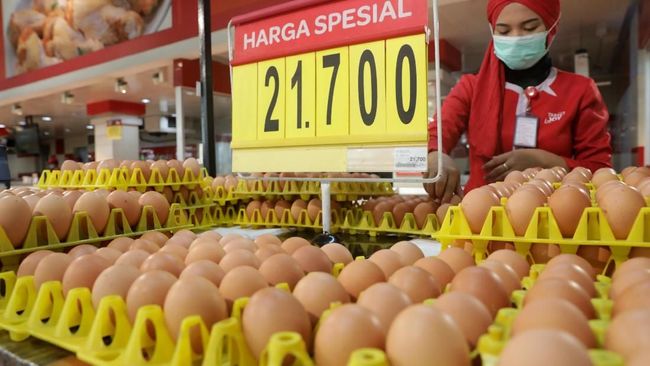Jakarta, CNBC Indonesia – Two months in a row Indonesia recorded deflation. The deflationary condition cannot be separated from the sluggish domestic economy due to the Covid-19 pandemic.
Bank Indonesia (BI) predicts deflation will still occur this September. In its latest price monitoring survey (SPH), BI estimated deflation of 0.01% (month on month/ mom) will still happen this month.
Therefore, inflation for the calendar year for September will be at 0.92% (ytd) and on an annual basis at 1.46% (yoy). Reflecting on the last two months, deflation continues.
The Central Statistics Agency (BPS) recorded deflation in July of 0.1% (mom), thus annual inflation was at 1.54% (yoy). Then in August deflation was recorded at 0.05% (mom) and annual inflation at 1.32% (yoy).
The latest update of the SPH BI shows that there are still many commodities, especially strategic foodstuffs, that have recorded a decline in prices.
“The main contributors to deflation during the reporting period were broiler chicken at -0.05% (mtm), red onions at -0.03% (mtm), red chilies and eggs of broilers each at -0. 02% (mtm), as well as bird’s eye chilies, oranges, and gold jewelry each of -0.01% (mtm). ” wrote BI.
If you look at the price movements of fresh broiler chicken in the last month, there has been a decline. On August 6, 2020, the price of fresh purebred chicken in domestic traditional markets was recorded at IDR 33,200 / Kg. However, at the end of last week the price fell to IDR 30,550 / kg, or down almost 8%.
The price of shallots has also decreased quite deeply. In the last month, the price of this Brebes superior commodity has fallen 7.4% from Rp 32,950 / kg on August 6 to Rp 30,500 / kg last weekend.
The decline in prices was also followed by other strategic food commodities such as red chilies and fresh eggs. For the same period, the price of red chilies fell 16.2% to IDR 30,850 / kg from IDR 36,800 / kg.
Turning to fresh eggs, the price of this commodity has decreased which is not as deep as the prices of other commodities such as chicken, shallots and red chilies. Within a month, the price of fresh purebred chicken eggs in traditional markets throughout the country fell 2.86% to IDR 25,400 / Kg from IDR 26,150 / Kg.
Meanwhile, the decline in gold prices was triggered more by the decline in global gold prices, which had already reached its highest level and was pressured by the strengthening US dollar. Gold prices are already very high, of course, decreasing buying interest and ending up in depressed precious metal prices.
Indeed, not all commodity prices have dropped or experienced a decline. Some commodities have even experienced price increases. Call it branded garlic and cooking oil in packaging.
The two food commodity prices have actually risen in the past month. The price of garlic increased 16.6% to IDR 26,350 / Kg from IDR 22,600 / Kg in the market.
Meanwhile, the price of cooking oil has also increased, although not as much as the price of garlic. In the same period, the price of oil rose 0.68% from IDR 14,600 / Kg to IDR 14,700 / Kg.
If there is still deflation in September, then deflation will even occur for three consecutive months or throughout the third quarter of 2020. The thinness of the inflation rate or even deflation could occur due to many factors, ranging from maintained supply to controlled inflation expectations.
However, low inflation or deflation could also indicate that there is pressure from the demand side as well, considering that output during the pandemic period cannot be expected. This demand pressure shows the Indonesian economy is not healthy.
During the PSBB program to reduce the number of cases of Covid-19 infection, many workers in the formal and informal sectors were affected. Millions of workers had to be laid off and laid off. The impact of income decreases and purchasing power is eroded.
This pressure on purchasing power can also be observed from the slowing down of the core inflation rate in recent months. Core inflation in August was already very close to 2%. Whereas previously it was still at almost 3% (yoy).
The eroded purchasing power is clearly a nightmare for RI. This is because more than 55% of the posts forming the country’s economic output (GDP) are contributed by domestic consumption. When domestic consumption contracted by more than 5% (yoy) in the second quarter, economic growth in the same period also shrank by 5.3% (yoy).
If deflation continues in the third quarter, it is not impossible that contraction in household consumption will still occur and economic growth could be minus again. If the third quarter is minus again. RI has legitimately fallen into the brink of recession.
CNBC INDONESIA RESEARCH TEAM
(which / which)
– .


